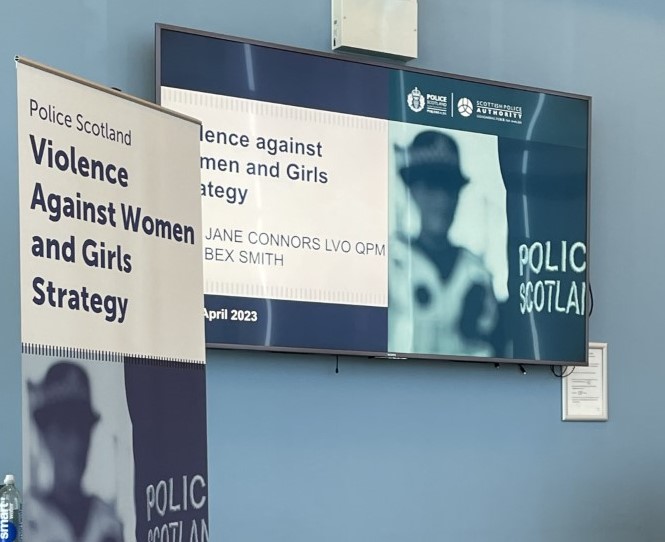"I knew that even if I found a way of putting into words what was happening to me, no one would really listen anyways, they never have, I learned a long long time ago that my pain, my fear, my hurt means nothing to no one, other than to tell me its wrong. I just wish one day I could get it right" -SWAN Member August 2022
- 9/10 autistic women have experienced sexual violence
- Autistic women experience higher rates of domestic violence, coercive control, sexual violence and interpersonal victimisation than their peers
- A range of studies show 49-89% of autistic adults experience violence and abuse from within a close relationship
- 3/4s of autistic children experience bullying at school
- Autistic adults are 7-9 times more likely to die by suicide than their peers
At SWAN, experiences of abuse, violence, neglect, social exclusion and controlling relationships are far too common, and so many go unheard, dismissed or disbelieved.
SWAN is working to ensure that all autistic victims are validated, listened to, and understood, so we can get the help and support that we need when something happens. And, even more importantly, that autistic women and girls are better safeguarded and less at risk of harm within society.
Why do so many autistic women and girls experience abuse?
Abuse or violence of any kind is never the victim’s fault. Responsibility always lies with the perpetrator, and with them alone.
- Lack of knowledge and understanding of autistic women and girls' communication and emotional expression
- Safeguarding practices are often not adjusted to meet the needs of an autistic individual
- Autistic people often live a life of invalidation, marginalisation, and unmet needs. We are told that the way we move, communicate, connect or express emotions is wrong and we need to change to fit in better or be more acceptable. The traumatic impact of this results in poor mental health, low self-esteem, masking and people-pleasing. Hiding our pain, squashing down our own feelings and expecting others to hurt us as part of socialising becomes second nature
- Autistic girls and women are often missed or misdiagnosed, and experience barriers to early identification and access to diagnosis due to stereotyped views of what autism looks like. It is difficult for us to understand and advocate for our needs if we don't know what they are ourselves
- Autistic women and girls are often excluded, rejected and very isolated
- A lack of appropriate education about sex and healthy boundaries through an autistic lens leaves us unequipped to navigate relationships
- Autistic people often communicate in a very honest and purposeful way. We expect the same from others and can find it hard to pick up on hidden meanings, nuance and harmful intentions
- We can have very different experiences of emotions and body sensations and may not portray pain or discomfort in the same way or have words to describe how we feel, often resulting in people misinterpreting our experiences
- Having our sensory experiences ignored or dismissed can mean that we are accustomed to discomfort, pain and traumatic experiences. We normalise this and stop questioning or expressing when something hurts, is uncomfortable, scary or loud. We are told to stop 'making a fuss', 'attention seeking' or 'being dramatic' - so we stop saying anything at all
- Many autistic women and girls struggle with internalised ableism, the messages we have heard from the world become our own internal narrative - it's our fault, we are wrong, we are not good enough, we need to try harder, do better, stop causing problems...
- We are often used to people talking for us, talking about us and making decisions for us - taking away our agency
- It can be hard for us to develop bodily autonomy when other people often don't respect our boundaries, particularly if we require support with communication or personal care
What has SWAN been doing?
- Supporting autistic women and girls to feel safe, feel validated in their experiences,, explore their autistic identity and become less isolated
We have delivered groups and webinars aimed building confidence and finding a voice, including:
- Our Post Diagnostic Group, which covers topics like relationships, connection and boundaries.
- Our Webinars, including 'Boundaries and Beliefs and How the World Shapes Us' with Evaleen Whelton, and 'Self Advocacy' with Barb Melville.
- Raising awareness of what is happening to autistic women and girls and sharing the voice, experiences and learning of our community
- Through TV and print media, with recent interviews with Vivienne Aitken, Health Editor at the Daily Record, and on the BBC 'The Nine' programme.
- By delivering our autistic-led SWAN training across health and social care services, schools, charities, community groups, employers and other organisations.
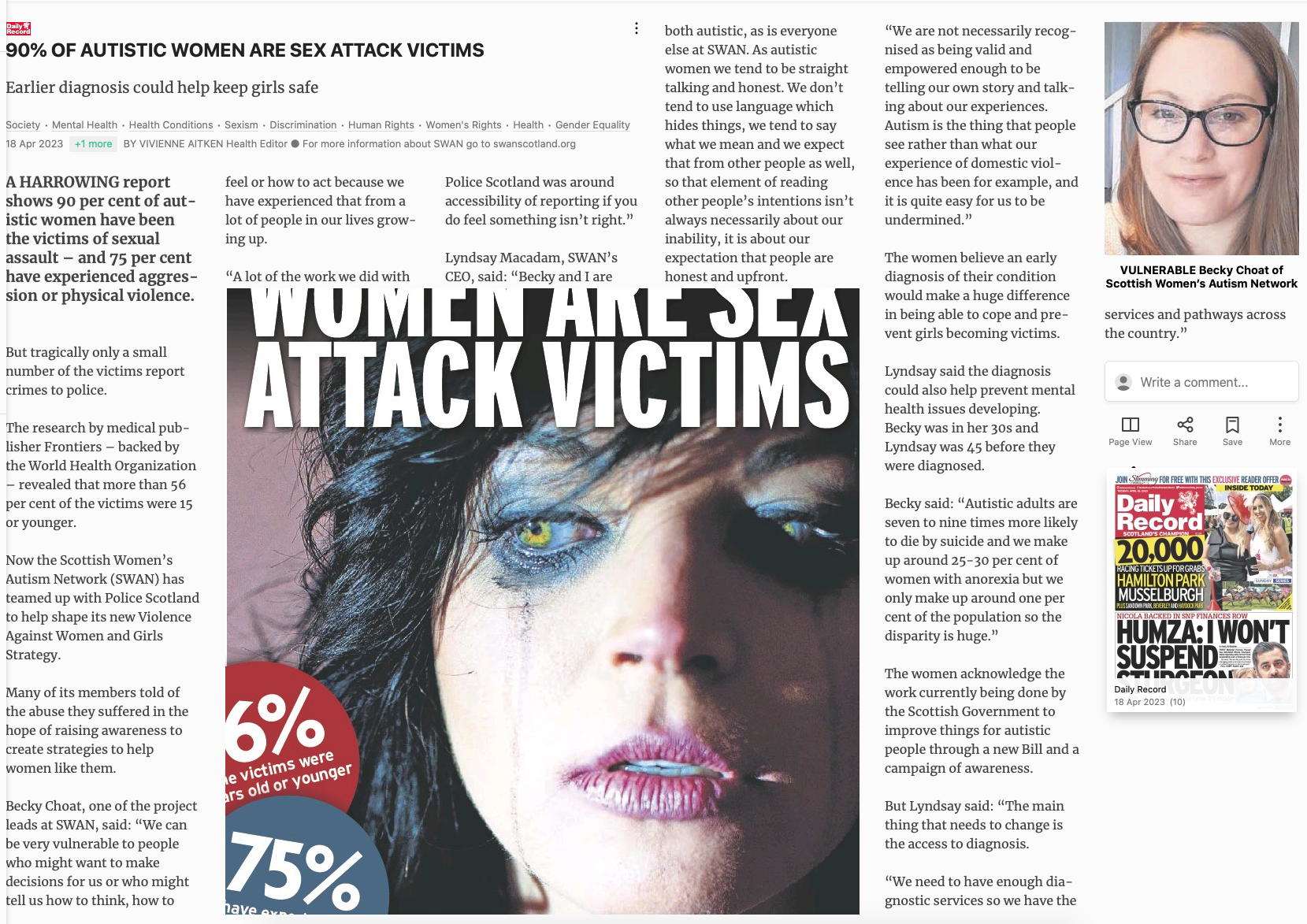
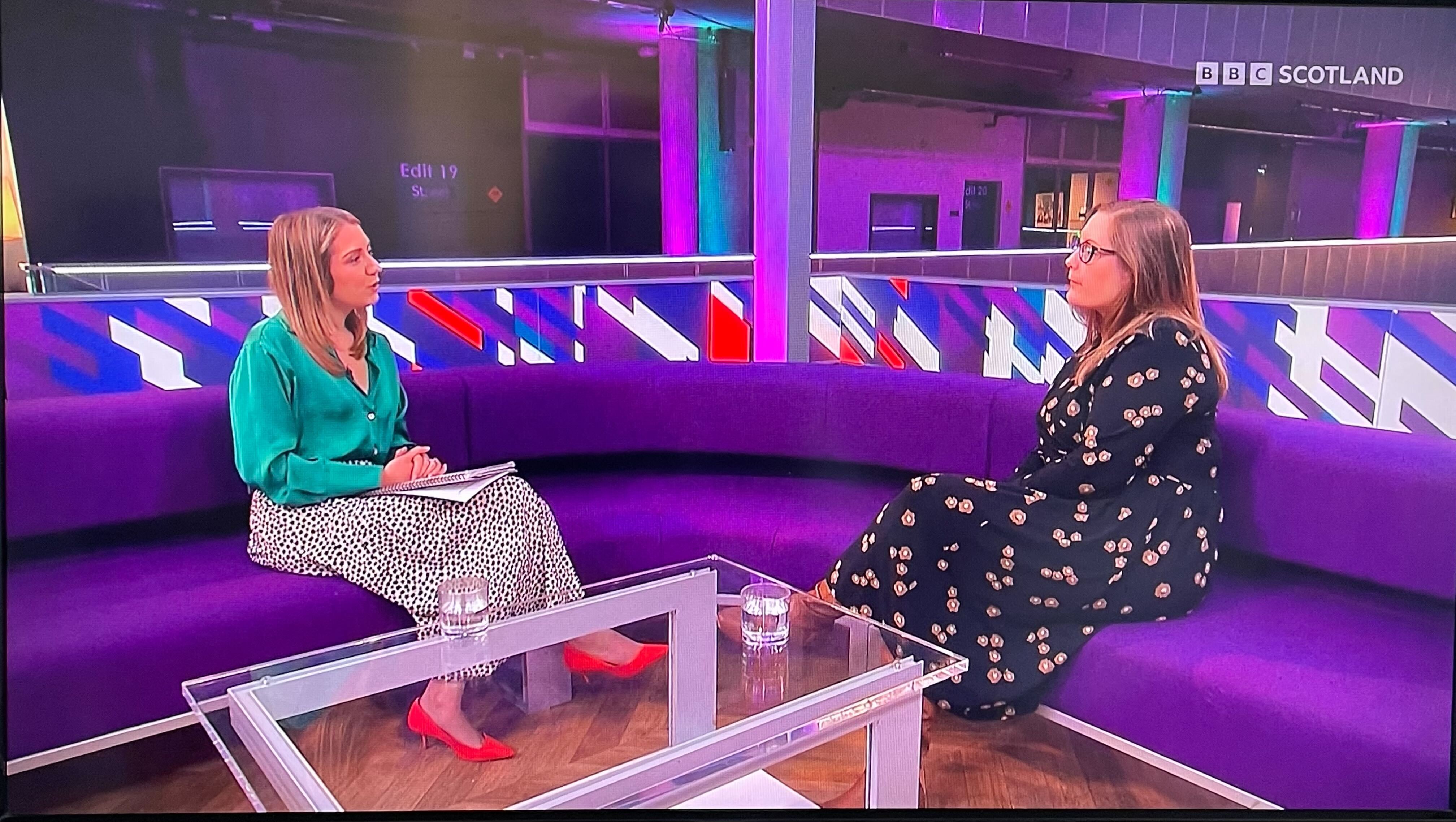
- Working in partnership to change systemic practice and improve access to support and reporting
In July 2022 SWAN began working with the Police Scotland Strategy, Insight and Engagement Team, to contribute to the development and delivery of engagement activities aimed at involving the public in shaping the new Violence Against Women and Girls Strategy.
Both SWAN and Police Scotland felt it was critical that any strategic approach to tackling Violence Against Women and Girls (VAWG) is developed with a strong evidence base which fully embeds lived experience, hidden harms and impacts of all women, including the voices and experiences of autistic women.
SWAN reviewed the proposed public consultation for accessibility and inclusivity, then worked with Police Scotland to organise focus groups and 1-1 interviews and support autistic women to access their online consultation to share their stories and experiences.
We are enormously grateful to all the women and non-binary people from the SWAN network who shared their experiences, using their voices to make a change for others and help remove barriers to reporting. Many of those who spoke to us had never communicated what had happened to them before, or had faced disbelief or felt dismissed or victim blamed if they did.
Some shared their stories with us but didn't feel ready to be involved in the consultation and we know there will be others who couldn't reach out but have also been victims. We hope this process will contribute to improved knowledge and understanding of autistic experiences, more accessible reporting, and an increase in support services.
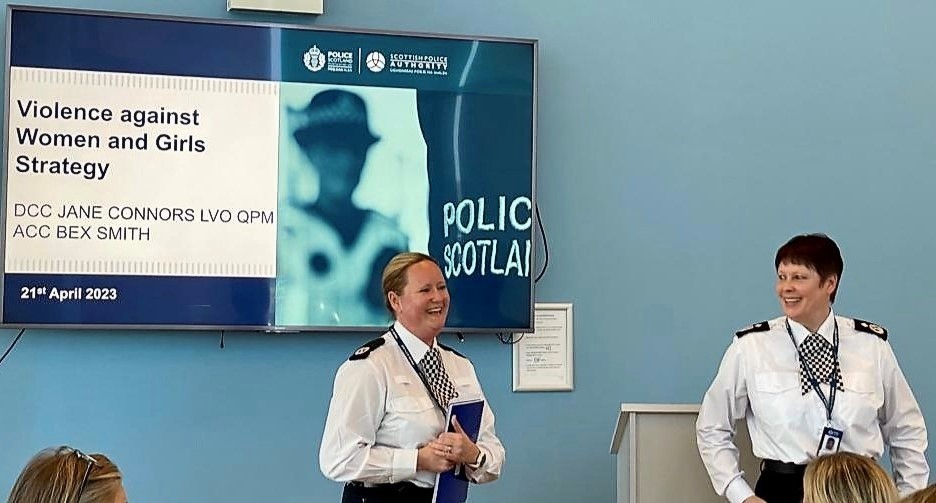
SWAN attended a strategy launch event in April 2023, where Police Scotland shared their findings, thanking those who participated and building on existing partnership working with stakeholders involved in the consultation process.
"The insights provided were extremely valuable and we worked closely with our Strategy and Planning team to ensure these were implemented throughout the development of Police Scotland’s new Violence Against Women and Girls Strategy. We want to thank you again for taking the time to participate, being so open and honest about your experiences and providing feedback on our work. It is truly appreciated and valued"
You can read the consultation responses on the Police Scotland website
We look forward to seeing the strategy implemented and future work with Police Scotland.
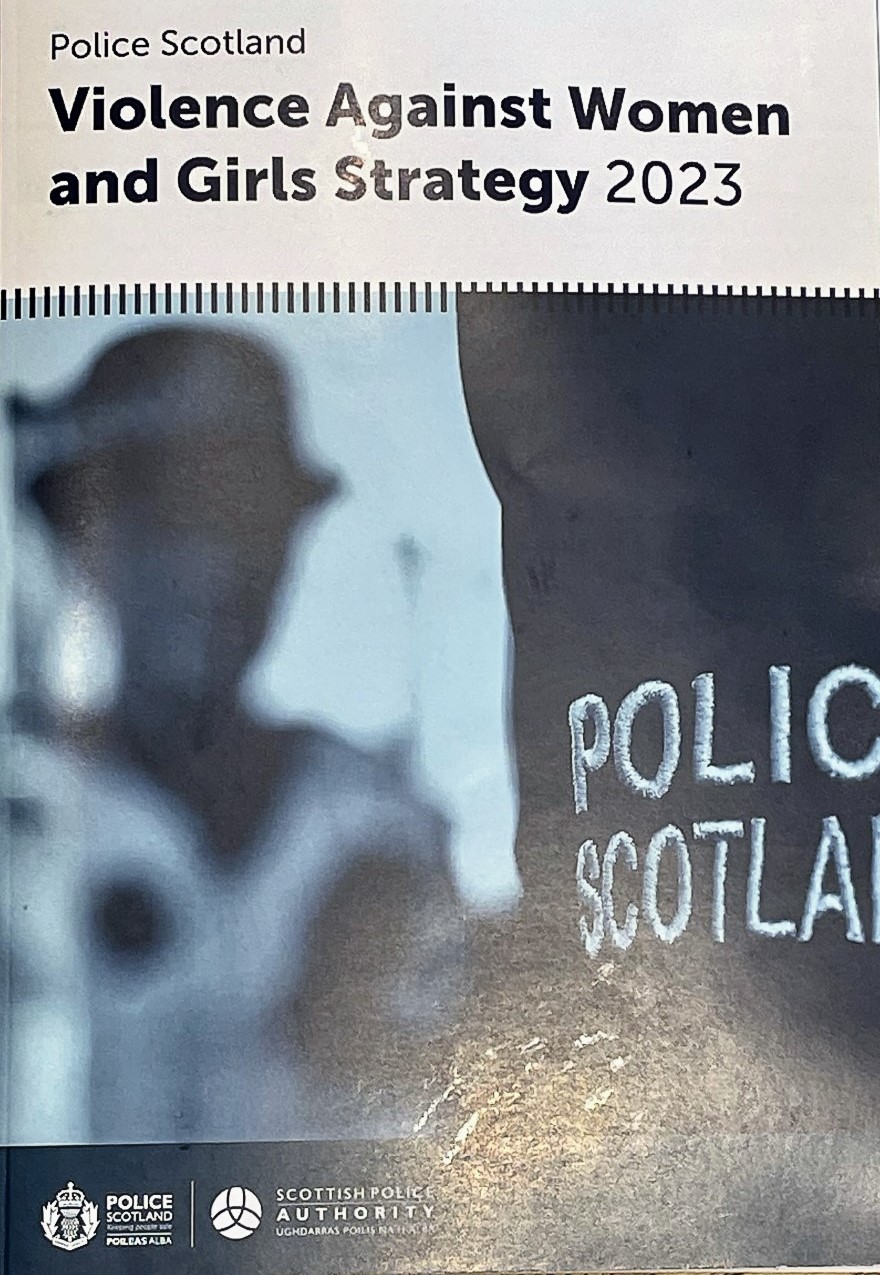
Moving forwards what would help?
- Improved access to early diagnosis to support self-understanding and advocacy
- Greater availability and access to autistic-led spaces that provide community, peer support and resources to support the development of a positive sense of self
- Appropriate, autistic-informed education on sex and healthy relationships
- Appropriate, autistic-informed safeguarding practices
- Teaching body awareness, bodily autonomy, consent, boundaries, and interpreting people's intentions - rather than systems and therapies that are based on conditioning, compliance and encouraging masking
- Increased understanding of autistic identity - debunking myths, unhelpful narratives and stereotypes for professionals and parents/carers
- Developing a culture of acceptance through listening to, and valuing, the autistic community
- Improved accessibility to reporting processes
- Increased understanding of autistic communication and experiences, to reduce misinterpretation or dismissal when we ask for help
- Validating autistic experience and upholding the human rights of autistic women and girls
https://pubmed.ncbi.nlm.nih.gov/36605970/ "This Was Just How This Friendship Worked": Experiences of Interpersonal Victimization Among Autistic Adults
Nine out of ten autistic women are victims of sexual assault (openaccessgovernment.org)
Safegaurding Autistic Girls: Strategies for professionals - Carly Jones
https://www.bbc.co.uk/news/uk-64953941
Outcomes for disabled people in the UK - Office for National Statistics (ons.gov.uk)
https://medium.com/the-establishment/we-need-to-talk-about-the-domestic-abuse-of-autistic-adults-5df294504a13
https://www.glamourmagazine.co.uk/article/autistic-women-victims-sexual-abuse-violence
